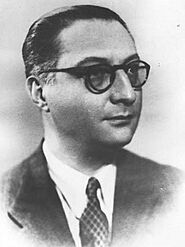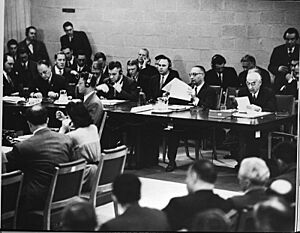Selim Sarper facts for kids
Quick facts for kids
Selim Sarper
|
|
|---|---|
 |
|
| Minister of Foreign Affairs | |
| In office 28 May 1960 – 16 February 1962 |
|
| Prime Minister | Cemal Gürsel, Emin Fahrettin Özdilek, İsmet İnönü |
| Preceded by | Fatin Rüştü Zorlu |
| Succeeded by | Feridun Cemal Erkin |
| Personal details | |
| Born | 14 June 1899 Istanbul, Ottoman Empire |
| Died | 11 October 1968 (aged 69) Ankara, Turkey |
| Political party | Republican People's Party (CHP) |
| Spouse | Kamuran Sarper |
| Children | daughters: Ülker (Sarper) Kural, Ayşe (Sarper) Vanlı |
| Alma mater | Humboldt University of Berlin Ankara University, Law School |
| Profession | Diplomat, politician |
Selim Rauf Sarper was an important Turkish diplomat and politician. He was born in Istanbul on June 14, 1899. He passed away in Ankara on October 11, 1968. Selim Sarper served as Turkey's Minister of Foreign Affairs from 1960 to 1962.
Contents
Early Life and Education
Selim Sarper was born in Istanbul in 1899. He spent his teenage years in Germany. There, he finished high school in 1918. He then went to the University of Berlin to study law.
When he was 24, the Republic of Turkey was founded. After returning home, he studied at Ankara University, Law School. In 1923, he worked as a French teacher in Adana. Later, he was a clerk at the Independence Tribunal. In 1927, he started working as a translator for the Ministry of Foreign Affairs.
A Career in Diplomacy

Selim Sarper began his diplomatic career in 1928. He was appointed vice-consul in Odessa, which was then part of the Soviet Union. In 1929, he became a secretary at the Turkish Embassy in Moscow. Two years later, he was promoted there.
He held many important roles. In 1933, he was Consul in Komotini, Greece. In 1935, he was Consul in Odessa again. He became Consul in Berlin, Germany in 1937. In 1939, he was Ambassador in Bucharest, Romania.
During the 1940s, Sarper led the government's Press and Information Agency. He was in charge of official information during World War II.
Ambassador to Moscow
In 1944, Selim Sarper became Turkey's Ambassador to Moscow. This was a very important job during the end of World War II. It was also important during the start of the Cold War (1947-1991).
At one point, there was a concern that the Soviet Union might claim Turkish land. This was based on a conversation Sarper had with the Soviet Foreign Minister. Because of this, Turkey decided to become allies with the United States.
Later, documents showed that Sarper told the U.S. Ambassador about this conversation. He did this even before telling his own government. However, his report to the U.S. Ambassador did not mention any threat. The Soviet Minister also denied such a claim.
Other Diplomatic Roles
After Moscow, Sarper continued his important diplomatic work. In 1946, he became Ambassador to Italy in Rome. In 1947, he became Turkey's Permanent Representative to the United Nations. This meant he represented Turkey at the UN.
In 1957, he became Turkey's Permanent Representative to NATO. NATO is a military alliance between many countries.
Political Career
On May 28, 1960, a day after a change in government in Turkey, Selim Sarper was appointed Minister of Foreign Affairs. He took over from Fahri Korutürk.
Sarper later joined the Republican People's Party (CHP). He ran for a seat in the parliament in the 1961 general elections. He won and continued to serve as Minister of Foreign Affairs until February 16, 1962.
In the 1965 general elections, Sarper was re-elected. He became a member of parliament for Istanbul Province.
Later Life and Passing
On May 14, 1968, Selim Sarper had lung surgery for the second time. He passed away on October 11, 1968, in Ankara. His body was then moved to Istanbul. He was survived by his wife, Kamuran, and his two daughters, Ülker and Ayşe.

